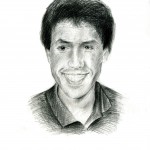Unless things go really badly, this was the only presidential election I’ll experience as an undergrad. I’m a sophomore, so I wasn’t in college the last time Barack Obama won a presidential election, but I’ve heard the stories. Hundreds of students gathering on Old Campus, embracing one another, laughing and cheering and crying. Shortly after midnight, one group began singing the national anthem, and the music spread and swelled. They held hands, forming a gigantic, united circle.
I was still a high school sophomore in Pennsylvania — the state John McCain tried the hardest to win, yet lost. Before the election only a handful of my classmates stood for the Pledge of Allegiance, which blared out from the loudspeaker in a nasal monotone every morning. But the day after President Obama’s victory, my homeroom class rose as one, standing to recite the pledge, hands on hearts. Every single person was inspired to stand.
[media-credit id=12121 align=”alignleft” width=”150″] [/media-credit]That inspiration is gone. Maybe it never existed at all. It was a fluke, a statistical blip, a false start. Or perhaps the president genuinely inspired my generation, only to leave us standing at the altar, a cold metallic taste in our mouths.
[/media-credit]That inspiration is gone. Maybe it never existed at all. It was a fluke, a statistical blip, a false start. Or perhaps the president genuinely inspired my generation, only to leave us standing at the altar, a cold metallic taste in our mouths.
A few weeks ago, Obama won again, filling colleges across America with a sense of relief, if not exhilaration. There were election parties and celebrations, but no massive crowds or jubilant singing. Few students swarmed Old Campus, and the silence of the night remained largely unbroken. It’s hard not to contrast the two celebrations. And it’s hard not to notice a larger trend — a tendency toward apathy among young people.
College students used to stand for something. The Students for a Democratic Society (SDS), Student Nonviolent Coordinating Committee (SNCC) and others formed a veritable alphabet soup of radical youth protest. They rioted and rebelled, standing atop police cars and taking over administrative buildings. Student political leaders carried real clout and students straddled a uniquely powerful soapbox. Think of the free speech protests at Berkeley or the anti-war riots at Kent State. In 1968, youth protesters stormed the Democratic National Convention in Chicago, demanding change and chanting, “The whole world is watching, the whole world is watching.” Not for the first time, the whole world was watching the actions of youth. Perhaps for the last time, though.
When I first arrived as a freshman at Yale, I was struck by the palpable sense of political apathy. Few people seemed to care about the upcoming election — the pervasive idea was that every option was pretty bad, so why bother. Sure, the Yale College Democrats and Yale College Republicans were active during this election season, canvassing and phone banking to the point of exhaustion. I’ve heard their efforts may even have exceeded those of four years ago. But compare this to the Yale of the 1960s and 1970s, when student political activity rocked the campus. When an infamous Black Panther trial was held in New Haven in 1970, students went “on strike” to express their outrage; the strike was so successful that all classes were made optional.
The most conventional excuse for the political apathy on college campuses is that there is simply less to get worked up about. Back in the swinging ’60s there was the Cold War, the civil rights movement and Vietnam. The very fate of our society was at stake, so of course students freaked out. But now things are fine — sure, we need to work out a few of the kinks, but there’s no need to make too much noise.
I don’t know what caused this weird sense of complacency. Maybe with the job market and economy in such dire straits, college students have to be more focused on their studies. Maybe it’s because our country has been at war since we’ve been old enough to be politically involved, so it seems like there are bigger fish to fry. Or maybe it’s just that that our generation merely participates in a different way: have a problem, make a Facebook group! Whatever the reason, this mentality is misguided.
This needs to change now. Right now. With colleges infected with apathy, I fear for my future. It’s time for activism to make a comeback. We must reinvent student political activity, making it possible and exciting and urgent for today’s youth. We shouldn’t rely on President Obama for inspiration. It’s time that we stand up and shout. We don’t need a new hero — we need a new mindset.
Scott Stern is a sophomore in Branford College. Contact him at scott.stern@yale.edu .







